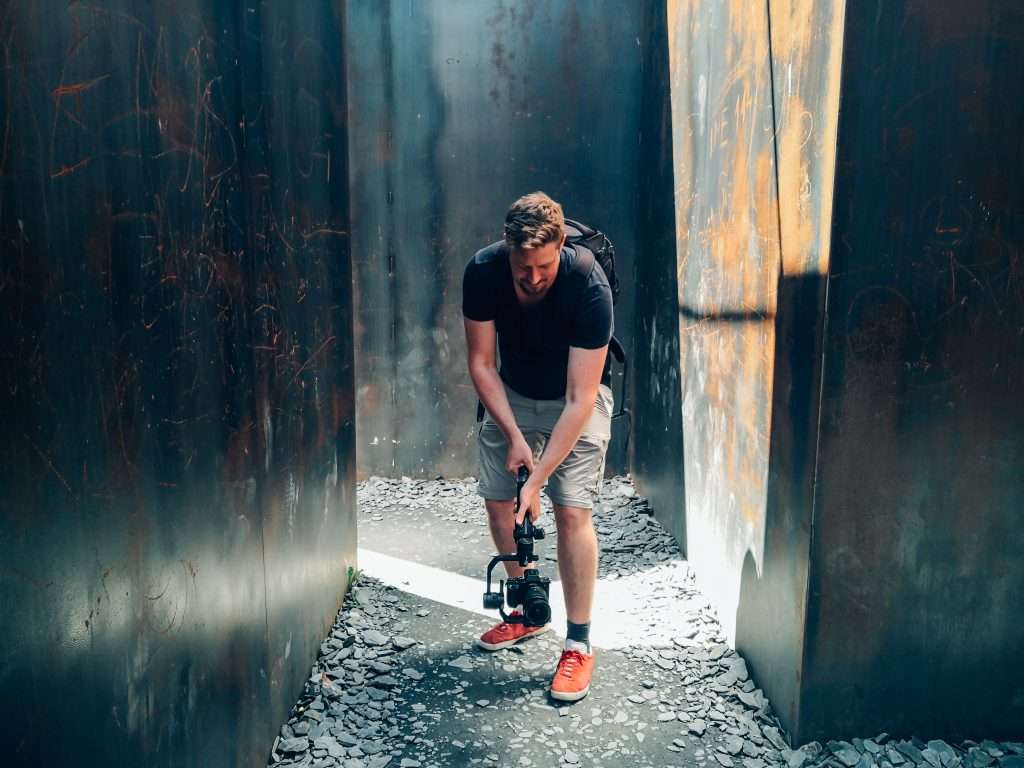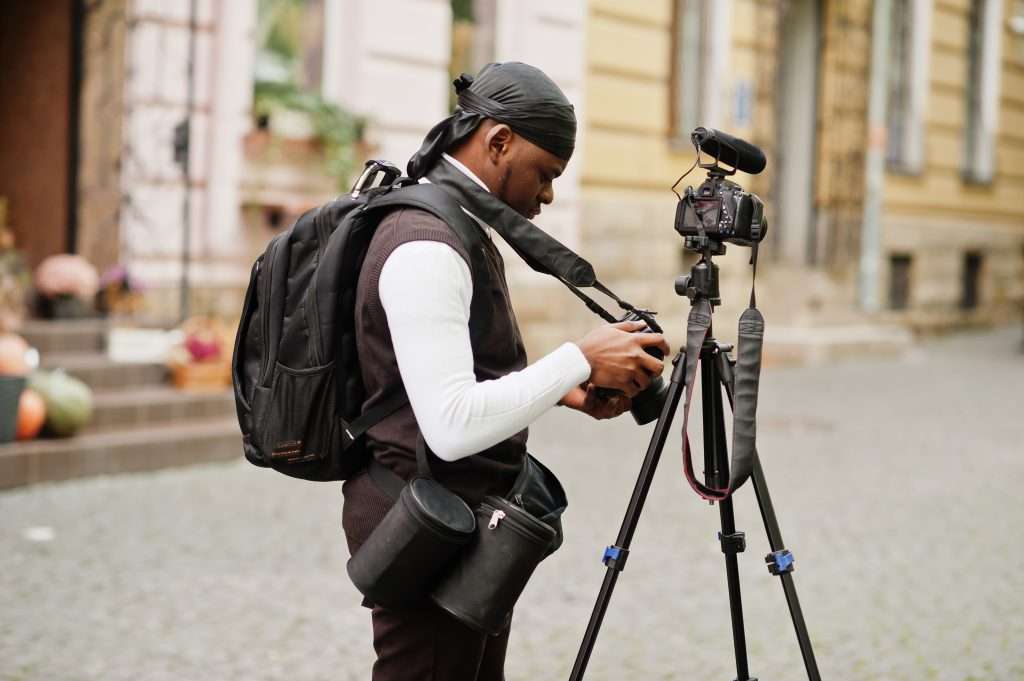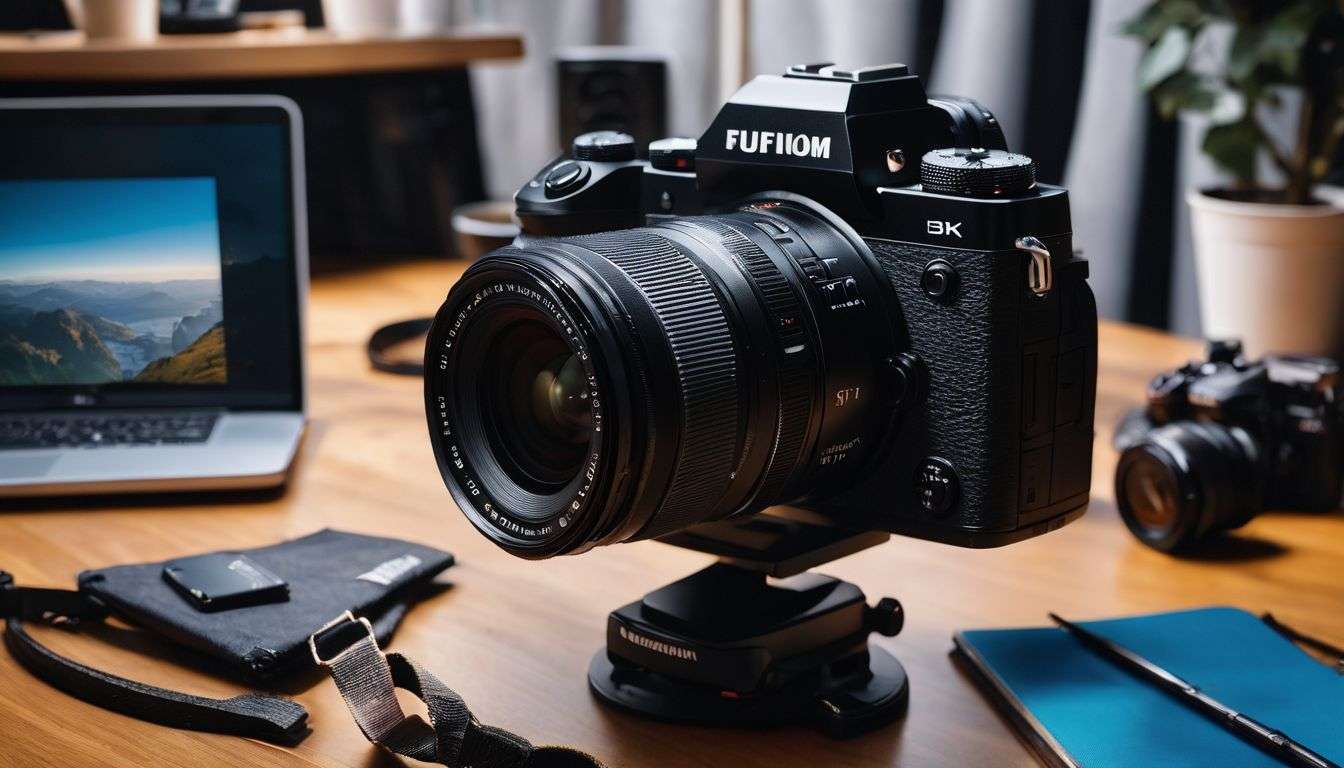Ever fancied knowing what a videographer does? We’re with you on that. Driven by curiosity, we’ve conducted a thorough exploration into this fascinating career to bring you an easy-to-understand guide.
This blog post promises to shed light on the duties, skills, and qualifications essential for a successful career in videography. Keep your eyes peeled – this is set to be quite the enlightening read!
Key Takeaways
- A videographer is responsible for recording live events, shooting and editing high-definition videos, and planning video projects for various purposes.
- They use digital video equipment and editing software to create visually stunning videos that engage audiences.
- Attention to detail, good communication and collaboration skills, as well as the ability to work under pressure and meet deadlines are important qualities for a successful career in videography.
- Videographers have diverse opportunities in film and television production, advertising, event coverage, and digital media. Freelance and self-employment options are also available.
Duties and Responsibilities of a Videographer

A videographer is responsible for recording live events, small-scale video productions, and documenting various projects using high-definition equipment. They also play a role in shooting and editing videos, collaborating with clients and team members to plan and execute video projects for different purposes.
In addition, a videographer must be skilled in operating and maintaining video equipment to ensure optimal performance.
Recording live events and small-scale video productions
We use cameras to tape live events like concerts, sports meets, and weddings. We also film small-scale videos for business ads or school projects. Our key job is to tell a story using moving pictures.
This needs good planning and an eye for the best shots. We must set up well before the event starts to get all our gear ready. And we need more than one camera angle for quality video clips that make our work stand out.
During editing, we pick the best footage and put it together in a clear way that engages viewers from start to end.
Shooting and editing high-definition videos
As videographers, we take charge of shooting high-definition videos. We use digital equipment to capture moving images in the best quality. These can be for events, films or ads. It’s our job to get the right angles and light levels.
Once filming is over, it’s time to move on to editing what we’ve shot. Using special software, we cut and arrange video clips from raw footage. This process can take a long time but it helps us tell stories with film and videos that are visually stunning and engaging.
Our goal is always to create something that people will enjoy watching!
Planning and executing video projects for various purposes
We work on lots of video projects. Each one has a special aim or goal. We start by thinking about what the client wants from the video. This plan helps us know what kind of shots we need to get and how all these shots go together to tell a story or share a message.
After that, we set up our gear and shoot the video. Once it’s shot, we take it into post-production phase where we cut out what’s not needed and add effects to make it look great!
Operating and maintaining video equipment
We use and look after video gear. The gear records clear videos. We set up the cameras before we start filming. Once done, we check if all things work right. This can take some time but it makes sure our work goes smooth later on.
After shooting, we clean everything and put it back in its place again for next time use. It’s key to do this well so the gear lasts long and works best each time we need it.
Collaborating with clients and team members
As videographers, we work closely with clients and team members. This is key to making great videos. We talk about ideas and plans with our clients first. Then, we make sure everyone on the team knows what to do.
Cooperation makes the filming smooth and easy. Good teamwork results in good videos that every client loves.
Deep Dive: What does a Videographer Do??

A videographer spends a lot of time shooting videos. They use digital video devices to capture moving images. Creativity is key in this job. They make stories come alive using film and video.
Videographers need good timing too, as some shots can be just four seconds long.
Another big part of their job is editing footage after filming. This process, called post-production, helps turn raw clips into engaging videos that tell a story or share a message.
Attention to detail is important here as the final product needs to look good and draw people in.
Videographers also record events such as weddings or corporate functions – these often need multiple camera angles for the best result. Sometimes they work alone on projects like music videos or documentaries, but other times they’re part of a team.
The work may vary day-to-day but always centres around making high-quality videos.
Skills and Qualifications Required for a Videographer
To excel as a videographer, one must possess proficiency in using digital video equipment and editing software, display creativity and artistic vision, pay strong attention to detail, have good communication and collaboration skills, and be able to work under pressure and meet deadlines.
Proficiency in using digital video equipment and editing software
Using digital video equipment and editing software is key for a videographer. This skill helps to make top-quality videos. A videographer uses cameras, lights and sound gear to shoot video.
The next step is to take the shots and turn them into a story using editing software. Being good at this needs both time and practice. It also calls for an eye for detail so that every clip adds value to the final product.
Training and hands-on experience help build this skill set over time.
Creativity and artistic vision
Creativity is a crucial quality for videographers. They need to think outside the box and bring innovative ideas to their work. With their artistic vision, they can capture visually stunning shots and create compelling narratives through film and video.
Whether it’s choosing the right angles, framing the subject perfectly, or using visual effects creatively, videographers use their creative skills to make each video unique and captivating.
Their artistic vision helps them transform raw footage into meaningful stories that engage viewers and leave a lasting impact.
Strong attention to detail
As videographers, we understand the importance of having a strong attention to detail. Every frame and shot in a video counts, so it’s crucial for us to pay close attention to even the smallest details.
This includes ensuring proper lighting, framing the subject correctly, capturing clear audio, and maintaining visual consistency throughout the video. We also take great care during the post-production process, meticulously editing and fine-tuning each clip to create a polished final product.
By having a keen eye for detail, we can deliver high-quality videos that captivate audiences and effectively convey our clients’ messages or stories.
In addition to these technical details, we also focus on the little things that enhance the overall viewing experience. This can include choosing appropriate background music or sound effects that complement the visuals, selecting seamless transitions between scenes, and integrating text or graphics in an aesthetically pleasing way.
By paying attention to these finer points of videography, we ensure that our videos look professional and leave a lasting impact on viewers.
Good communication and collaboration skills
As videographers, we understand the importance of good communication and collaboration skills in our work. We need to be able to effectively communicate with clients, understanding their vision and requirements for a video project.
Clear communication is also crucial when working with team members, such as camera operators or editors, ensuring that everyone is on the same page and working towards a common goal.
Collaboration is key in bringing together different creative ideas and perspectives to create a high-quality final product. Whether it’s discussing shot angles or brainstorming editing techniques, being able to collaborate effectively allows us to produce videos that meet the needs and expectations of our clients.
Ability to work under pressure and meet deadlines
Meeting deadlines and working under pressure are crucial skills for videographers. We understand that completing video projects on time is essential for client satisfaction and the success of our work.
Whether it’s shooting a live event or editing raw footage, we need to be focused, efficient, and organized to ensure that everything is done within the given timeframe. This requires effective time management, multitasking abilities, and the ability to handle stress calmly.
By staying calm under pressure and meeting deadlines consistently, we deliver high-quality videos that exceed expectations.
Job Outlook and Career Opportunities for Videographers
The demand for videographers is growing in various industries, offering opportunities in film and television production, advertising, event coverage, and digital media. Freelance and self-employment options are also available for those looking to work independently.
Growing demand for video content in various industries
Video content has become increasingly popular across various industries, leading to a growing demand for videographers. Many businesses recognize the power of video in engaging and communicating with their target audience.
Companies use videos for marketing campaigns, product demonstrations, training materials, and corporate events. In addition to businesses, other industries such as entertainment, education, sports, and journalism also rely on video content to convey messages effectively.
As technology continues to advance and social media platforms thrive on visual content, the need for skilled videographers is expected to rise even further. This presents numerous career opportunities for aspiring videographers who possess the necessary skills in shooting and editing high-quality videos.
Opportunities in film and television production, advertising, event coverage, and digital media
There are many opportunities for videographers in various industries. Here are some of the areas where videographers can find work:
- Film and television production: Videographers can work on film sets, shooting scenes and capturing footage for movies and TV shows.
- Advertising: Videographers are in demand to create video advertisements for businesses and brands to promote their products or services.
- Event coverage: Videographers can be hired to film live events such as weddings, concerts, conferences, and sporting events.
- Digital media: With the rise of social media platforms and online content, there is a growing need for videographers to create videos for websites, blogs, and social media channels.
Freelance and self-employment options
As videographers, we have the opportunity to explore freelance and self-employment options. This means that we can work independently or as part of a small team, taking on different projects and clients.
We have the freedom to choose the projects we want to work on and set our own schedules. This allows us to have more control over our careers and the types of videos we create. Whether it’s shooting documentaries, music videos, or event coverage, freelance videography offers flexibility and the chance to showcase our creativity while meeting client needs.
With the growing demand for video content in various industries, there are plenty of opportunities for us to establish ourselves as skilled professionals in this field. So if you’re passionate about capturing moving images and telling stories through film, freelancing as a videographer could be an exciting path for you!
Conclusion
In conclusion, a videographer plays an important role in capturing and creating visually captivating videos. They record live events, shoot and edit high-definition footage, and plan video projects for different purposes.
With their creativity and attention to detail, videographers bring stories to life through moving images. They collaborate with clients and team members to deliver high-quality videos that engage audiences.
Whether it’s filming weddings or producing corporate documentaries, videographers are skilled professionals who add value to the world of visual storytelling.
Are the Duties of a Videographer in Photography Similar to Those of a Videographer in General?
The duties of a videographer in photography differ from those of a videographer in general. While a videographer in general focuses on capturing moving images regardless of the subject, a videographer in photography is specifically responsible for filming and editing videos related to the field of photography.
FAQs
1. What does a videographer do?
A videographer is someone who captures and records videos for various purposes, such as events, documentaries, or marketing materials.
2. What skills are needed to be a videographer?
To be a videographer, it is important to have skills in operating cameras and other equipment, framing shots creatively, editing videos, and understanding lighting and composition.
3. Is formal education required to become a videographer?
Formal education is not always necessary to become a videographer, but having relevant training or a degree in film production can provide valuable knowledge and improve job prospects.
4. Do videographers work alone or with a team?
Videographers can work both independently as freelancers or as part of a team depending on the project requirements. They may collaborate with directors, producers, sound technicians, and other professionals.
5. How much does a videographer earn?
The earnings of a videographer vary depending on factors such as experience level, location, type of projects undertaken, and market demand. On average in the UK , they can earn between £20-£50 per hour .






